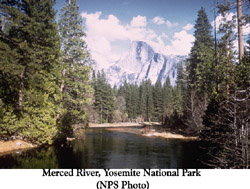 Can the Merced River survive serenely while construction continues in Yosemite Valley? That's the overriding question the Honorable Anthony Ishii will field later this month when the latest saga in the park's efforts to rebuild the valley after the 1997 flood comes to a head in the U.S. District Court for the Eastern District of California.
Can the Merced River survive serenely while construction continues in Yosemite Valley? That's the overriding question the Honorable Anthony Ishii will field later this month when the latest saga in the park's efforts to rebuild the valley after the 1997 flood comes to a head in the U.S. District Court for the Eastern District of California.
On one side you have the Friends of Yosemite Valley, which has successfully argued a time or three that Yosemite National Park officials have time and again failed to protect the Merced River corridor from impairment.
On the other, of course, is the Park Service, which thinks these guys are nuts.
You can tell that in the government's latest legal filing, the one that asks Judge Ishii to send the friends group packing for having the gall to ask him to ban the park from doing any construction work related to either the 2000 or 2005 Merced River Plan that could "impact or alter the Wild and Scenic Merced River's outstanding remarkable values" until the park adopts a court-approved comprehensive management plan.
Throughout this filing the government sprinkles phrases such as "adamantly and unequivocally oppose the plaintiffs' remaining request," "there is no basis in law or equity for that type of relief," and "the plaintiffs are badly misinformed."
Harsh words from the Park Service, which, by the way, hasn't fared too well in court over its efforts to build a legally compliant management plan for the Merced River.
After all, previously courts at various times have found that the Park Service's Merced River plans have violated the federal Wild and Scenic Rivers Act by failing to establish a "user capacity" for the section of river that flows through the park, violated the National Environmental Policy Act, and violated the federal Administrative Procedures Act.
And these guys say the Friends of Yosemite Valley are misinformed?
Sadly, this battle has been mired in the courts for years and is only making lawyers rich. Come October 16th in a Fresno, California, courtroom the friends group and the government will appear before Judge Ishii with their various requests, backed by rafts of paper.
At stake is construction of the first phase of the new Yosemite Lodge, utilities work, removal of the old El Portal wastewater treatment plant, maintenance of the Yosemite Valley Loop Trail, construction of campsites to replace roughly a quarter of the 353 lost in the 1997 flood, and a handful of other projects.
While the Park Service views these projects as beneficial and environmentally sensitive, the friends group counters that "the NPS is plainly influenced by commercial interests at odds with the public interest, and at odds with the goal of protecting the park."
No doubt, there's a little truth in each side's message. Unfortunately, it seems the only way a solution can be reached is through litigation.

 Support Essential Coverage of Essential Places
Support Essential Coverage of Essential Places







Comments